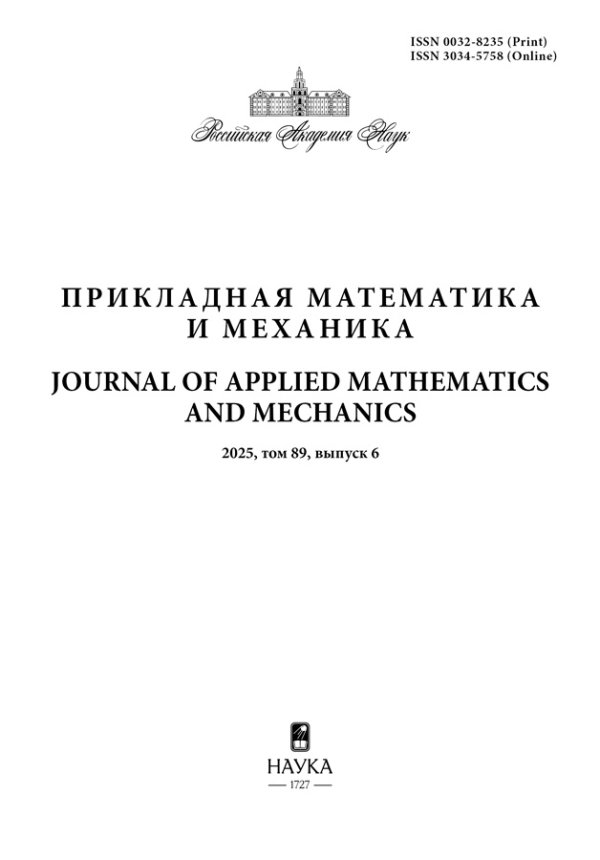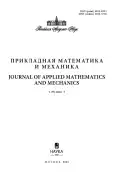Ricci tensor in the problem on thermoelastic stresses
- Authors: Pestov K.N.1,2, Guzev M.A.3, Lyubimova O.N.1,4
-
Affiliations:
- Khabarovsk Branch of the Federal State Budgetary Institution of Science
- Vladivostok Branch of the Russian Customs Academy
- Institute of Applied Mathematics FEB RAS
- Far Eastern Federal University
- Issue: Vol 89, No 4 (2025)
- Pages: 533-545
- Section: Articles
- URL: https://journal-vniispk.ru/0032-8235/article/view/308595
- DOI: https://doi.org/10.31857/S0032823525040011
- EDN: https://elibrary.ru/vkrnkh
- ID: 308595
Cite item
Abstract
The paper is devoted to the interrelations between stresses, temperature change field, and the Ricci tensor in problems of linear thermoelasticity. A new model of thermoelastic states is proposed. It is demonstrated that inelastic (thermoelastic) behavior is due to the Ricci tensor, which is in turn determined by the temperature field inhomogeneities. The classical linear thermoelastic models can be treated as a special case of the proposed model while the specific assumptions concerning the strain tensor are applied.
About the authors
K. N. Pestov
Khabarovsk Branch of the Federal State Budgetary Institution of Science; Vladivostok Branch of the Russian Customs Academy
Email: kopestov@yandex.ru
M. A. Guzev
Institute of Applied Mathematics FEB RAS
Email: kopestov@yandex.ru
O. N. Lyubimova
Khabarovsk Branch of the Federal State Budgetary Institution of Science; Far Eastern Federal University
Author for correspondence.
Email: kopestov@yandex.ru
References
- Kondo K. On the geometrical and physical foundations of the theory of yielding // Proc. Japan Nat. Congr. Appl. Mech., 1953, vol. 2, pp. 41–47.
- Bilby B.A., Bullough R., Smith E. Continuous distributions of dislocations: a new application of the methods of non-Riemannian geometry // Proc. Roy. Soc. A., 1955, vol. 231, pp. 263–273. https://doi.org/10.1098/rspa.1955.0171
- Krener E. General Continuum Theory of Dislocations and Intrinsic Stresses. M.: Mir, 1965. 104 p. (in Russian).
- Efrati E., Sharon E., Kupferman R. Elastic theory of unconstrained non-Euclidean plates // J. of the Mech. & Phys. of Solids, 2009, vol. 57, no. 4, pp. 762–775. https://doi.org/10.1016/j.jmps.2008.12.004
- Fressengeas C., Taupin V. A field theory of strain/curvature incompatibility for coupled fracture and plasticity // Int. J. of Solids & Struct., 2016, vol. 82, pp. 16–38. https://doi.org/10.1016/J.IJSOLSTR.2015.12.027
- Grachev A.V., Nesterov A.I., Ovchinikov S.G. The gauge theory of points defect // Phys. Stat. Sol. (b), 1989, vol. 156, pp. 403–410. https://doi.org/10.1002/pssb.2221560203
- Kadich A., Edelen D. Gauge Theory of Dislocations and Disclinations. Moscow: Mir, 1987. 168 p. (in Russian).
- Struzhanov V.V. On residual stresses after rolling and stratification of two-layer strips // Bull. of SamSTU. Phys. Ser.-Mat. nauki., 2010, vol. 5, pp. 55–63.
- Withers P. J. Residual stress and its role in failure // Rep. on Prog. in Phys., 2007, vol. 70, no 12, pp. 2211–2264. https://doi.org/10.1088/0034-4885/70/12/R04
- Godunov S. K., Romensky E. I. Elements of Continuum Mechanics and Conservation Laws. Novosibirsk: Nauch. kniga, 1998. 280 p. (in Russian)
- Guzev M.A. The structure of kinematic and force fields in the Riemannian continuum model // J. Appl. Mech. & Tech. Phys., 2011, vol. 52, no 2, pp. 39–48.
- Guzev M. A., Paroshin A. A. Non-Euclidean model of zonal disintegration of rocks around an underground mine // J. Appl. Mech. & Tech. Phys., 2001, vol. 42, no 1, pp. 147–156.
- Makarov V.V., Guzev M.A., Odintsev V.N, Ksendzenko L.S. Periodical zonal character of damage near the openings in highly-stressed rock massif conditions // J. Rock Mech. Geotech. Engng., 2016, vol. 8, no 2, pp. 164–169. https://doi.org/10.1016/j.jrmge.2015.09.010
- Guzev M.A., Makarov V.V., Ushakov A.A. Modeling the elastic behavior of compressed rock samples in a pre-destructive area // Phys.-Tech. Problems of Mining, 2005, no. 6, pp. 3–13.
- Myasnikov V.P., Guzev M.A. Affine-metric structure of an elastic-plastic model of a continuous medium // Proc. of the MIAN, 1998, vol. 223, pp. 30–37.
- Myasnikov V.P., Guzev M.A. Geometric model of the defective structure of an elastic-plastic continuous medium // PMTF, 1999, vol. 40, pp. 163–173.
- Novatsky V. Theory of Elasticity. Moscow: Mir, 1975, 872 p. (in Russian)
- Klyushnikov V. D. Derivation of the Beltrami–Mitchell equations from the Castigliano variational equation // PMM, 1954, vol. 18, no. 2, pp. 250–252.
- Kovalenko A.D. Thermoelasticity. Kiev: Vishcha shkola, 1975. 216 p. (in Russian)
- Boli B., Weiner J. Theory of Temperature Stresses. Moscow: Mir, 1964. 517 p. (in Russian)
- Borodachev N.M. Solutions to the spatial problem of the theory of elasticity in stresses // Prikl. Mekh., 2006, vol. 42, no 8, pp. 3–35.
- Kucher V.A., Markenscoff X., Paukshto M.V. Some properties of the boundary value problem of linear elasticity in terms of stresses // J. Elasticity, 2004, vol. 74, no 2, pp. 135–145. https://doi.org/10.1023/B:ELAS.0000033858.20307.d8
- Pobedrya B.E. On a static problem in stresses // Moscow univ. Matem., Mech. Bull., 2003, no 3, pp. 61–67.
- Pobedrya B.E., Georgievskii D.V. Equivalence of formulations for problems in elasticity theory in terms of stresses // Russ. J. Math. Phys., 2006, vol. 13, no 2, pp. 203–209. https://doi.org/10.1134/S1061920806020063
- Vasiliev V. V., Fedorov L. V. Compatibility Equations and Stress Functions in Elasticity Theory // Mech. of Solids, 2022, no 4, pp. 114–129.
- Lurie S. A., Belov P. A. Generalized Cesàro Formulas and Third-Order Compatibility Equations // Mech. Bull, 2023, vol. 78, pp. 110–113.
- Anferov P. I., Pyanykh T. A., Sheveleva I. V. Quasistatic problem of thermoelasticity for a strip in stresses // J. Appl. Mech. & Tech. Phys., 2022, vol. 63, pp. 1057–1064. https://doi.org/10.1134/S0021894422060190
- Dubrovin B.A., Novikov S.P., Fomenko A.T. Modern Geometry. Methods and Applications. Moscow: Nauka., 1986. 1104 p. (in Russian)
- Guzev M. A., Lyubimova O. N., Pestov K. N. Beltrami–Mitchell equations in a non-Euclidean continuum model // Far East. Matem. J., 2024, vol. 24, no 2, pp. 178–186. https://doi.org/10.47910/FEMJ202416
- Norden A. P. Spaces of Affine Connectivity. Moscow: Nauka, 1976. 432 p. (in Russian)
- Demidov S. P. Theory of elasticity: a Textbook for Universities. Moscow: Visshaya shkola, 1979, 431 p. (in Russian)
- Muskhelishvili N.I. Some Basic Problems of the Mathematical Theory of Elasticity. Moscow: Nauka, 1966. 708 p. (in Russian).
Supplementary files










